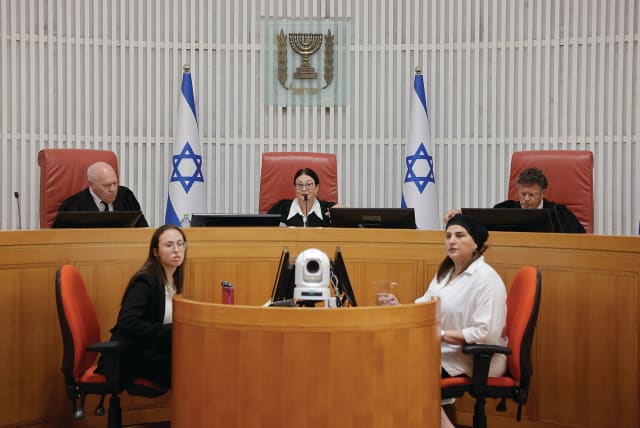Only three Israeli ministers say they'll respect any High Court ruling

Only Yoav Gallant, Gila Gamliel, and Moshe Arbel said they would respect a ruling by the High Court of Justice.
Three government ministers on Sunday said they will respect the High Court of Justice’s ruling if it strikes down the law to limit the reasonableness standard in a hearing on Tuesday.
The High Court will hear petitions for striking down the amendment that was passed in July to the Basic Law: Judiciary that greatly limits its ability to strike down government decisions on the basis of them being deemed irresponsible or unreasonable.
Petitions were filed against the amendment as soon as it passed, and if the High Court rules in their favor, this would be the first time it struck down part of a basic law.
Some coalition members have spoken out against the impending hearing. Knesset Speaker Amir Ohana (Likud) and Finance Minister Bezalel Smotrich (Religious Zionist Party) said the High Court would be working against Israeli democracy if it strikes down the law.
Which ministers would respect the High Court's ruling?
Not all of the coalition members agreed with that position.
“My position on this is known,” Defense Minister Yoav Gallant (Likud) said Sunday. “The State of Israel [has] a democratic rule of law. I will respect every High Court ruling.”
Health and Interior Minister Moshe Arbel (Shas) said he would “explicitly” respect the High Court’s ruling.
Intelligence Minister Gila Gamliel (Likud) said she “of course” would respect the ruling.
Opposition leader Yair Lapid and National Unity leader Benny Gantz praised the three ministers for their promise to respect the High Court’s ruling.
“Ministers Gamliel, Gallant, and Arbel said the obvious this morning, but unfortunately, we’ve reached the days when such a statement is so needed and important,” Gantz wrote on X (formerly Twitter). “I praise them for their brave standing in these crazy days and call upon all coalition members to be sane and clearheaded. You must respect the High Court’s ruling and prevent a dangerous legislative crisis.”
Lapid wrote: “I praise Ministers Gila Gamliel, Moshe Arbel, and Yoav Gallant for their clear standing on the side of the rule of law. It’s unbelievable that there is even a debate about whether the government will obey a High Court ruling or not.”
Communications Minister Shlomo Karhi (Likud) echoed Ohana’s and Smotrich’s sentiments.
“Ask the High Court judges if they intend on respecting Israeli democracy,” he said.
Construction and Housing Minister Yitzhak Goldknopf (United Torah Judaism) declined to give a straight answer and said: “We’ll decide together.”
Other ministers, including Prime Minister Benjamin Netanyahu, declined to answer the question. Netanyahu has not given an explicit answer to the question for weeks, although he has been asked it multiple times.
Other ministers who declined to answer were Israel Katz (Likud), Itamar Ben-Gvir (Otzma Yehudit), Orit Struck (RZP), David Amsalem (Likud), Nir Barkat (Likud), Idit Silman (Likud), and Meir Porush (UTJ).
Women’s Advancement Minister May Golan (Likud) said she would not respect a ruling to strike down the law.
The debate on respecting the High Court’s ruling has been going on for a few weeks, with other coalition MKs also expressing an opinion.
Last week, Constitution, Law, and Justice Committee chairman Simcha Rothman (RZP) said he would respect “any High Court ruling that is committed to the law.”
Otzma Yehudit MK Zvika Fogel said he would not accept the ruling if the High Court struck down the reasonableness clause amendment.
All this may not be an issue, however, as Netanyahu worked intensively to try to reach a compromise agreement on the judicial reform to prevent Tuesday’s hearing from taking place, sister newspaper Maariv reported.
According to Walla, Netanyahu might reveal an agreement on Monday that includes a draft for an amendment to the Basic Law: Government, which would significantly limit the use of reasonableness for judicial overview but anchors capriciousness and arbitrariness clauses that give the court the ability to continue to supervise the government from a different angle.
The reasonableness standard will once again be able to be used during election periods as it was before, according to that proposal, Walla reported.
Jerusalem Post Store
`; document.getElementById("linkPremium").innerHTML = cont; var divWithLink = document.getElementById("premium-link"); if (divWithLink !== null && divWithLink !== 'undefined') { divWithLink.style.border = "solid 1px #cb0f3e"; divWithLink.style.textAlign = "center"; divWithLink.style.marginBottom = "15px"; divWithLink.style.marginTop = "15px"; divWithLink.style.width = "100%"; divWithLink.style.backgroundColor = "#122952"; divWithLink.style.color = "#ffffff"; divWithLink.style.lineHeight = "1.5"; } } (function (v, i) { });

